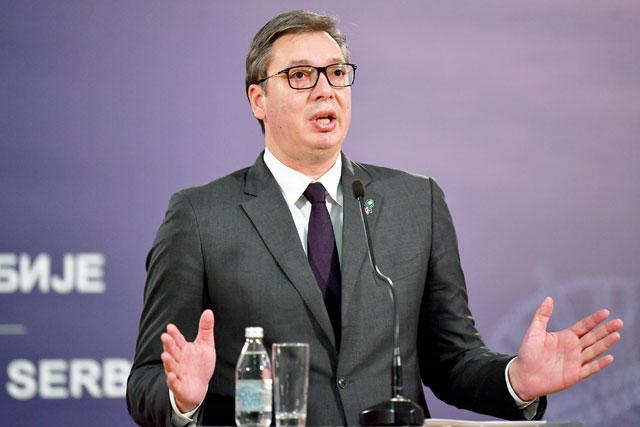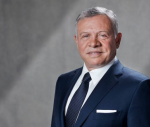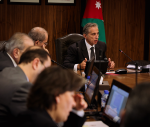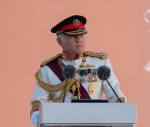You are here
EU warns Serbia over Jerusalem embassy move
By AFP - Sep 07,2020 - Last updated at Sep 07,2020
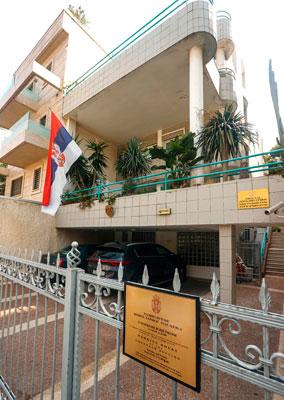
This photo taken on Saturday shows a view of the exterior of the Embassy of the Republic of Serbia, at its current premises in Tel Aviv (AFP photo)
BRUSSELS — The EU voiced "serious concern and regret" on Monday over Belgrade's commitment to move its embassy in Israel to occupied Jerusalem, casting a shadow over the resumption of Serbia-Kosovo talks.
President Aleksandar Vucic of Serbia and Kosovo Prime Minister Avdullah Hoti were to meet in Brussels for a second round of EU-brokered face-to-face talks to resolve disputes two decades after clashing in war.
The meeting follows a high-profile summit at the White House where Vucic and Hoti signed statements agreeing to measures to improve economic relations — and in Serbia's case, committing to moving its embassy from Tel Aviv to Jerusalem.
The EU is still committed to the so-called "two state solution" in which Jerusalem will be the capital of both Israel and a future Palestinian state, and its own diplomatic mission is in Tel Aviv.
The bloc expects prospective members like Serbia to align with its foreign policy positions.
"In this context any diplomatic steps that could call into question the EU's common position on Jerusalem are a matter of serious concern and regret," EU foreign affairs spokesman, Peter Stano, told reporters in Brussels.
Breaking with longstanding diplomatic practice, President Donald Trump's administration in December 2017 recognised Jerusalem as Israel's capital and moved the US embassy to the city.
Long-running dispute
Washington touted the agreements signed by Vucic and Hoti on Friday as a major breakthrough, but on Monday the two leaders issued a joint statement giving a far more cautious read.
"The recently agreed documents in Washington DC, building on previous dialogue-related commitments undertaken by the two parties, could provide a useful contribution to reaching a comprehensive, legally binding agreement on normalisation of relations," the statement said.
In one of Europe's most intractable disputes, Serbia has refused to recognise Kosovo's declaration of independence since the province broke away in the bloody 1998-99 war that was ended only by a NATO bombing campaign against Serb troops.
Both Kosovo and Serbia are facing mounting pressure from the West to resolve the impasse which is seen as crucial to either side joining the EU.
More than 13,000 people died in the war, mostly Kosovo Albanians, who form a majority in the former province.
One key question is diplomatic recognition for Kosovo — five of the EU's 27 countries do not acknowledge its independence.
The two sides have been in EU-led talks for a decade to normalise their relationship, but little progress has been made, with a raft of agreements concluded in 2013 yet to be fully implemented, and the previous round of negotiations broke down in 2018 after a series of diplomatic tit-for-tats.
Vucic and Hoti resumed face-to-face talks in Brussels in July but the effort got off to a frosty start, with the Serbian leader accusing Pristina of trying to "blackmail" Belgrade.
EU diplomatic chief Josep Borrell, who is hosting the Brussels talks along with the EU's special representative Miroslav Lajcak, said Monday's meeting would focus on "non-majority communities and the settlement of mutual financial claims on property".
"Both topics are very sensitive and very important for the future relationship between Kosovo and Serbia and for the everyday life of their people," Borrell said.
Related Articles
BELGRADE — "Truly historic", "a real breakthrough" and "very big" — US President Donald Trump let the superlatives flow when he announ
BANJSKA, Kosovo — Gunmen holed up in a northern Kosovo monastery clashed with authorities on Sunday, according to Prime Minister Albin Kurti
BELGRADE — Washington's envoy to the Western Balkans on Monday criticised the EU for delaying the start of membership talks with North Maced


